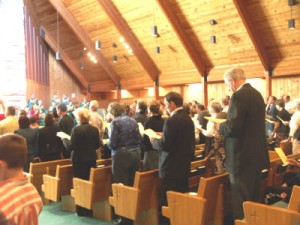Helping Recovering People Reconnect With the Church
 Over twenty years ago, Rev. Maurice Vanderberg, Executive Director of City Union Mission in Kansas City, hung the purpose of their new Christian Life Program on their chapel wall. It is a statement that should de scribe the intent of all rescue mission re covery programs:
Over twenty years ago, Rev. Maurice Vanderberg, Executive Director of City Union Mission in Kansas City, hung the purpose of their new Christian Life Program on their chapel wall. It is a statement that should de scribe the intent of all rescue mission re covery programs:
Our goal is to see every man becomes a mature, contributing member of a Christian community.
People become homeless because they are disconnected from meaningful rela tionships with others. They don’t know how to access social support systems. And, for most, their trust level is at about zero. As they complete our resi dential recovery programs, we must as sist them to become “plugged-in” to places where they will experience the support, nurture, and encouragement they need to grow in faith and in sobri ety.
Becoming active in a church home is ab solutely essential for homeless addicts who want to establish themselves in a new, independent, sober and godly lifestyle. They must develop a personal system of ongoing support that replaces the structure provided by the mission residential program. This might also in clude participation in support groups and finding a program sponsor. All of this can only be accomplished if we have a definite “aftercare” strategy in place.
Attending Sunday morning worship at a local church is required by most mission programs. Sadly, their experience of the Church looks something like this:
The mission van pulls up to the church door and the clients file into the building.
They find a safe place to sit, usually in the back of the church.
They stay in their own group and have little contact with other people at the worship service.
After the service ends, they file back into the van after ex changing a few words with the greeters at the door.
This is so tragic, because the Body of Christ is the greatest support network there ever was. And, we know that par ticipating in a local congregation is es sential for Christian growth.
Here are a few suggestions for rescue mission personnel that may be useful in helping program participants to make the sometimes difficult transition into a supportive body of believers:
A. Find “Mission Friendly” Churches
Probably the first place to look for “mis sion friendly” churches is the list of those who are already active with your chapel services and other activities. Just as we must visit support groups before sending program participants to them, we also need to personally visit the churches they attend. The reason for this is simple: not all churches can handle people from rescue missions. Some have a theology that is not compatible with our approach to recovery. For others, getting involved with rescue mission cli ents might just be too much of a socio economic stretch.
B. Connecting with Pastors
Once you have identified those churches, visit with their pastors. Let them know your desire to work with them to help your clients find a spiritu4 home in their churches. The pastor can help you to enlist a few members of his church who could become church spon sors for people from the rescue mission.
Whenever possible, invite pastors to the mission so they can tour your facilities and learn about your programs. When I was a mission director, I was active in the local clergy council. A couple of times a year, we hosted their monthly meeting and provided a lunch. It’s al ways amazing to see how much more in terested people become in our missions when they have had a chance to set foot in our buildings and can see what we are actually doing.
C. Train the Church Sponsors
Once we have identified these “mission friendly” churches, schedule a few orientation sessions for the church sponsors. This is an opportunity to help them to better understand and reach out to mis sion clients we send their way. This could be accomplished in a single meet ing where a handbook could be given out with additional information. The goal is to develop a list of willing and equipped church sponsors that mission staff members could match up with mis sion program participants as they seek out a church home.
D. Christian Recovery Groups – A Bridge to the Christian Community
Most Christian recovery group meetings have several former addicts who are liv ing stable Christian lives. Because of their own experiences, these people can empathize with the struggles of home less addicts in a deeper way than most believers. We are sure to find some who will take our clients under their wings, serve as sponsors, invite them to their homes, and bring them to church with them.
If you have already developed a program to help mission program participants become integrated into the local Church, please contact us at the IUGM Education Department. We are gather ing materials on this topic that will be available to other member missions.
April 1998



